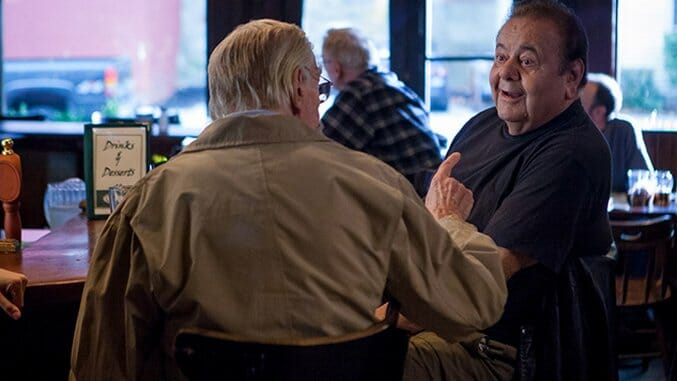The Last Poker Game
(2017 Tribeca Film Festival Review)
Photo: Tribeca Film Festival
As far as late-in-life career changes go, 72-year-old neurologist and Harvard professor Howard Weiner could’ve done much worse than making his directorial debut with The Last Poker Game. In fact, the director—whose son Ron is an Emmy-winning comedy writer for shows like 30 Rock and Silicon Valley—finds refreshingly candid humor in a movie that could’ve amounted to another Robert De Niro-esque, similarly late-in-life career embarrassment.
The film stars Martin Landau and Paul Sorvino as nursing home residents with gas still in the tank, Landau a doctor (“Not a mister!”) named Abe and Sorvino a horny gambler named Phil, the two quickly and wonderfully establishing a believable chemistry with Landau as the nerd and Sorvino the smooth-talker. Abe’s wife has late-stage dementia and Phil’s cataracts are the least of his health problems, but that doesn’t stop them from whining about how they can’t get erections anymore or how caretakers treat them like children.
Age has only made Landau’s lean expressions leaner, more noticeably chosen and thought-out, and his performance (be it for his wife or for the nursing home staff) is indicative of broader themes about aging masculinity and how it’s threatened. To allow this, The Last Poker Game basically ignores Abe’s wife (Ann Marie Shea) to go gallivant with the boys as they reckon with their manhood’s extinguishing relevancy. Shea is tasked with the rarely accomplished feat of capturing dementia on screen in a way that imbues it with the terror, confusion and sadness it deserves without tipping over due to clichéd weight. As viewers, we’re easily made uncomfortable by the possibility that an actor has been exploited, like an elderly cymbal-banging monkey. Shea reaches that point almost immediately, a wasted non-character until she shares an incredibly intimate sex scene with Landau that will make even the most jaded movie viewer flustered by a couple in their 80s seeking the female orgasm.
The film’s plot splits down two paths that never meet in a way either convincing or satisfying: One is the duo’s Porky’s-esque plan to get laid (a tall order for two men with complete erectile dysfunction) and the plight of adopted nurse Angela (Maria Dizzia) who’s applied at this specific home because she’s received a note saying that her birth father resides there. The former is surprisingly sweet while the latter surprisingly hokey. Dizzia does well in an unforgiving role, but her entire plotline (which is often dropped or ignored) is obviously The Last Poker Game movie at its weakest.